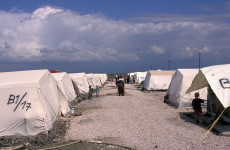Politics
From Refugee to Researcher: A Journey of Healing and Insight

Islam Borinca, a social psychologist and Assistant Professor at the University of Groningen, has transformed his traumatic past as a refugee into a profound academic career focused on reconciliation and healing. His journey from a turbulent childhood in Kosovo to academia highlights the resilience of the human spirit and the importance of addressing the scars of conflict.
At just eight years old, Borinca faced the harsh reality of loss when his family fled Kosovo during the war. They embarked on a treacherous journey, walking for days across the mountains into Albania. During this time, he lost his father and older brother, who were later murdered. The trauma of these events left him feeling confused and fearful as he sought refuge in a camp, grappling with emotions that were too heavy for a child to bear.
In the refugee camp, Borinca turned to art as a means of expression, sketching the chaos surrounding him on scraps of paper. “It was my way of making sense of the chaos around me,” he recalls. When his family eventually returned home, they found their house burned and their lives irrevocably altered. In that moment, Borinca made a silent vow: to honour his family’s suffering through education.
Over time, this commitment to learning evolved into a mission. Following his experiences in the refugee camp, he earned a Swiss Government Excellence Scholarship, allowing him to study in Geneva. He obtained a Ph.D. in social psychology and continued his research in Ireland before settling in the Netherlands. His academic focus centres on understanding human conflict and exploring pathways for communities to heal.
Learning from Ireland’s Experience
Borinca’s time in Ireland significantly shaped his research perspective. He became acutely aware of the nation’s own struggles with division and peacebuilding. “Reconciliation is never abstract. It is lived, fragile, and hard-won,” he noted, emphasising the need for courage in acknowledging each other’s humanity despite past grievances.
Reflecting on his past, Borinca considers how the boy he was in the refugee camp would view the man he has become. While the child might not grasp academic titles or degrees, he would understand the deep desire to find meaning in loss and the determination to help others navigate their suffering.
His personal journey has led to profound insights about trauma. “Trauma never disappears,” he explains. “It leaves a mark that cannot be erased – but it can be transformed.” He acknowledges the difficult choices that arise from pain, noting that guilt can either erode one’s spirit or fuel a life dedicated to purpose.
Transforming Trauma into Contribution
Today, Borinca’s research investigates how individuals dehumanise one another, and what it takes to reverse that damaging process. He explores the conditions that allow reconciliation to flourish after violence, aiming to foster mutual recognition among groups. For him, these academic inquiries are not just theoretical; they are deeply personal, tied to the vow he made as a child to transform suffering into contributions that help others heal.
Borinca’s experiences resonate with many, as millions of refugees face similar burdens while attempting to rebuild their lives. With over 120 million people displaced worldwide, the urgency of the questions Borinca grappled with as a child has intensified. He asserts that displacement does not equate to disconnection. Those forced from their homes can possess unique insights into the process of healing and rebuilding bridges across societal divides.
In reflecting on survival, Borinca concludes that it is merely the beginning of a more complex narrative. True transformation occurs when individuals learn to coexist with their memories, honouring loss without allowing it to imprison them. He often returns to his childhood drawings, recognising them as symbols of a promise—a commitment to understand and transcend violence.
“I learned that trauma cannot be erased, but it can be transformed,” Borinca states. He emphasizes that he is no longer defined solely by his past but by the contributions he makes to society. This pivotal shift illustrates not only his personal growth but also the powerful role of education and empathy in healing.
As Borinca continues his work in academia, he remains dedicated to helping others navigate the wounds of conflict, embodying the resilience and hope that define his remarkable journey from refugee to researcher.
-

 Top Stories3 months ago
Top Stories3 months agoTributes Surge for 9-Year-Old Leon Briody After Cancer Battle
-

 Entertainment4 months ago
Entertainment4 months agoAimee Osbourne Joins Family for Emotional Tribute to Ozzy
-

 Politics4 months ago
Politics4 months agoDanny Healy-Rae Considers Complaint After Altercation with Garda
-

 Top Stories4 months ago
Top Stories4 months agoIreland Enjoys Summer Heat as Hurricane Erin Approaches Atlantic
-

 World5 months ago
World5 months agoHawaii Commemorates 80 Years Since Hiroshima Bombing with Ceremony
-

 Top Stories3 months ago
Top Stories3 months agoNewcastle West Woman Patricia Foley Found Safe After Urgent Search
-

 Top Stories5 months ago
Top Stories5 months agoFianna Fáil TDs Urgently Consider Maire Geoghegan-Quinn for Presidency
-

 World5 months ago
World5 months agoCouple Convicted of Murdering Two-Year-Old Grandson in Wales
-

 World5 months ago
World5 months agoGaza Aid Distribution Tragedy: 20 Killed Amid Ongoing Violence
-

 World5 months ago
World5 months agoAristocrat Constance Marten and Partner Convicted of Infant Murder
-

 Top Stories4 months ago
Top Stories4 months agoClimbing Errigal: A Must-Do Summer Adventure in Donegal
-

 Top Stories4 months ago
Top Stories4 months agoHike Donegal’s Errigal Mountain NOW for Unforgettable Summer Views









